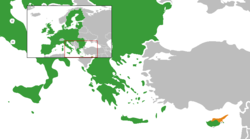Northern Cyprus and the European Union
 |
|
|
European Union |
Northern Cyprus |
|---|---|
Turkish Cypriots and the European Union have somewhat strained relations because the European Union (EU) does not recognise the self-declared Turkish Republic of Northern Cyprus.
Due to the Cyprus dispute, TRNC is recognized only by the EU candidate state Turkey. All other countries recognise the Republic of Cyprus, an EU member state, as the only legitimate government for the whole island. However the Republic of Cyprus de facto controls only the south of the island while the TRNC government controls the north.
Due to this dispute, northern Cyprus is de jure part of the EU by virtue of de jure being part of the Republic of Cyprus. It was hoped that the accession of the south in 2004 would provide the catalyst for unification so that a unitary state of Greek Cypriots and Turkish Cypriots could join the EU on 1 May 2004. In the end, Turkish Cypriots supported reunification, also because it would allow them to join the EU. However, the unification plan was voted down by the Greek Cypriots and Cyprus joined the EU in the face of the Republic of Cyprus.
As of 2016[update], the EU recognises the north as being outside the control of the Greek Cypriot-led government of the Republic and hence is temporarily exempt from EU legislation. The euro also does not officially circulate in the north (although it does have widespread usage) and the Schengen agreement is not in effect in Cyprus due to complications in security at the external border to the north. The free movement of goods, capital, services and people is also not in effect.
However, seats in the European Parliament are allocated based on the population of both north and south Cyprus together. Due to the problems in getting Turkish Cypriots to vote, this has been criticised and there have been proposals to have observer members direct from the north to sit in Parliament in order to represent those citizens.
...
Wikipedia
